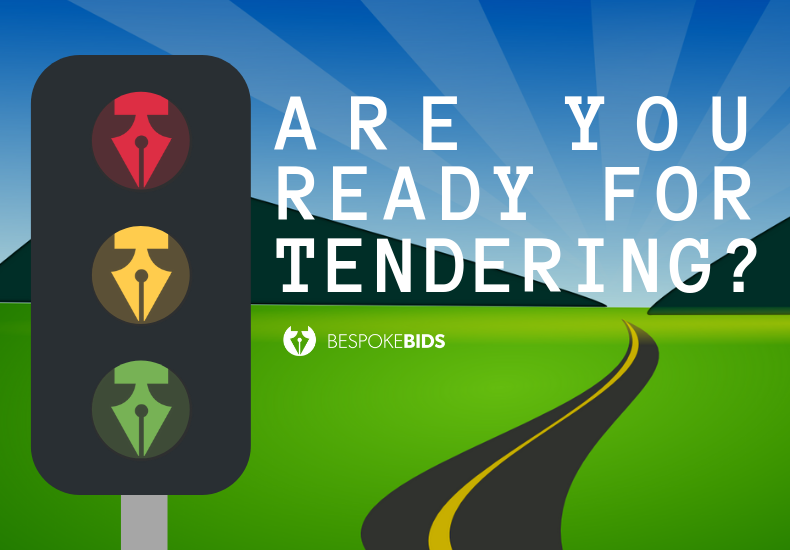
If you’re reading this, the chances are that you have at some point considered the world of tendering. You are certainly right to do so as there are many benefits to tendering and winning contracts through bids. However, it’s not for everyone and it’s important to know if and when you’re ready.
There are a number of factors which delineate those who are in prime position to tender and those who may need to hold off a little longer. If you’re not ready, you will most likely be wasting your time, but if you are, you could be in for a great deal of success.
Here are a few key indicators:
Experience

Experience is perhaps the most important factor in tendering. Every public tender will ask you for evidence of your experience and evidence of similar contracts you have previously delivered.
It is very important that you are able to offer good responses to these questions. If you can’t, you can be sure that other bidders will, and you will fail instantly in comparison.
Quite apart from qualifying for a tender, experience in delivering a formal contract can be just as important. As we will discuss shortly, if you don’t have the capability in experience, you shouldn’t bid.
Capability

If you do not have the necessary capabilities to service a contract in full and without fault, you should not apply.
If there is a particular sub-service, term or condition that you cannot meet or deliver, you will find yourself in breach of your contract and may be thrown off. At the very least, you must clarify precise contract requirements with the buyer before you decide to bid. As a rule however, if you can’t do it, don’t bid.
Not only do contract annulments bear significant cost in the short term, they can also affect your ability to tender successfully in the future. It is very important therefore to be completely confident in your own capabilities before you bid.
Turnover

Most tenders will require some level of minimum financial status in order for bidders to be successful. This is perhaps the easiest way to know whether a tender is worth your while or not. If you’re turning over £1m and the tender requires £3m, you won’t win.
Other tenders will not explicitly list minimum financial requirements although there is still a way to judge it.
We always recommend that clients never apply for a tender that is worth more than 1 third of their annual turnover. So if you’re turning over £1m, we recommend not applying for tenders that are worth any more than £300k.
By judging new opportunities using this indicator, you can be fairly sure as to your initial chances of success.
Qualifications / Accreditations

Many tenders, particularly in the services and works sectors will require you to have some form of industry-standard accreditation in order to qualify. More common ones include:
- SSIP (including CHAS)
- Constructionline
- Safecontractor
- ISO9001
- ISO18001
- ISO14001
- ISO27001
Each bid is different and the required accreditations vary between each. Requirements also vary based on specific industries or services. It is therefore important to read the tender documents carefully and ensure you meet all the minimum requirements. If you don’t, don’t bother bidding.
Social Value

Increasingly in recent years, social value has become more and more significant, particularly in public procurement. Local authorities have become particularly ardent in apportioning large sections of their scoring (sometimes up to 25% of the total score) towards social value.
It is important therefore to ensure that you do enough and have enough to say for these sections (when they’re present) to give yourself a good chance at scoring well.
We have written a full blog on social value and recommend that you have a read if you’re struggling here.
Price

The final indicator we’ll highlight here is pricing. As a smaller company looking to make their way, you may be unsure as to how best to price yourself in your tender.
There is a temptation to go in extremely low and undercut your competition, indeed there are cases of larger firms actually taking a loss on tendered contracts, purely to keep the competition away. This is rarely a good option however and can have severe consequences to the smaller SMEs.
Equally, you may find yourself pricing higher out of a need to cover the additional costs that can arise when breaking into the world of formal tendering. In this case, you will almost certainly score poorly as more experienced bidders undercut you.
Either way, you won’t know until you try, but we still recommend proceeding with caution in your pricing. Know your product, your market, your competition and your buyer and you should be fine.
Conclusions
Overall, the key things to consider when deciding whether you’re ready to tender are experience and competence. If you can reasonably tell yourself that you have enough of both, then by all means you’re ready to bid. Be shrewd and honest with yourself and you’ll have every chance of success.
Did you enjoy this post?
Check out one of our latest blogs on bidding myths and how not to fall victim.
Follow Bespoke Bids on Linkedin to keep up with our day-to-day operations. We post live tenders, tips and tricks and more.


